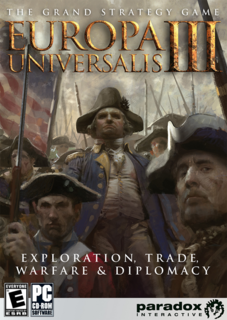Very addictive game but ultimately vacuous and frustrating
When I first started playing this game it seemed brilliant, the opportunity to play any country in the whole world from the time between 1399 and 1821 and to lead it to glory. It offered the possibility of taking you're own country on a different historical path, one which was more successful than what really happened. This may be the game's main appeal - to take any country and make it much more powerful than what it was historically.
This review is not going to be a description of the game, because it's much too complex to adequately describe in a few paragraphs, instead I'm just going to write about what I think of it.
Although this game offers an unparalleled level of complexity and depth of any strategy game I'm aware of, it's ultimately quite a one dimensional game. It's one dimensional in the sense that the only thing to really aim for is to expand constantly, all other elements of the game are side issues to the ultimate goal of adding more and more provinces, whether it be by colonisation or conquering. This makes the game very vacuous after a while because once you've got your country to a certain size there is nothing more for you to do except keep expanding and it just becomes terribly boring and dissatisfying. I think the lack of interactivity in the game is the source of this problem, the only real identifier of your achievements is the map and how many provinces you have so adding more and more provinces is really the only thing you can aim for.
Even though the game makers have went to extraordinary levels of complexity in attempting to depict the interactions of nations during the time period of the game, many of the mechanics of the game seem farcical. This, in my opinion, is highlighted by the idea of "lucky nations" which gives an artificial advantage to those nations that were historically successful during this period. If the game is so accurate and such a good representation of historical reality why does it need to create an artificial advantage for those countries to make sure they are as successful as they were historically.
The AI in EU 3 complete may be much better than the AI of the original EU 3 in that its much cleverer but every country seems to have an expansionist instinct built in and if they can expand, they will. This tends to lead to several very large countries developing in central and Eastern Europe and France always becomes a behemoth in Western Europe. So with all the complex mechanisms of the game they still haven't managed to accurately portray something close to what historically was the case. The game makers don't seem to have asked themselves the question "why did things turn out the way they did?" and then seek to replicate what really happened. Instead what they've done is created lots of very abstract mechanisms which really aren't very realistic or historically accurate at all.

